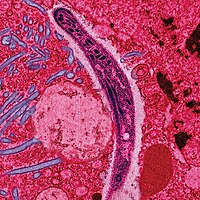
Photo from wikipedia
OBJECTIVE To evaluate dogs and cats undergoing total ear canal ablation with lateral bulla osteotomy (TECA-LBO), document antimicrobial choices, and determine relationships associated with infection-related and neurologic postoperative complications. ANIMALS… Click to show full abstract
OBJECTIVE To evaluate dogs and cats undergoing total ear canal ablation with lateral bulla osteotomy (TECA-LBO), document antimicrobial choices, and determine relationships associated with infection-related and neurologic postoperative complications. ANIMALS 107 client-owned dogs and 13 client-owned cats that underwent TECA-LBO. PROCEDURES A retrospective analysis of medicals records of dogs and cats with TECA-LBO from 2 veterinary hospitals with postoperative data for at least 6 months was performed. All information associated with the TECA-LBO surgery including follow-up was recorded. Logistic regression analyses were performed and corrected using a false discovery rate to identify significance between antimicrobial administration and other perioperative variables and the outcomes of short- and long-term neurologic and infection-related complications, need for revision surgery, and euthanasia due to recurrence of infection-related signs. RESULTS Intraoperative cultures were performed in 111 animals, and 95 (85.5%) had bacterial growth, with Staphylococcus spp most commonly isolated. Revision surgeries due to infection-related signs occurred in 13 of 120 (10.8%) patients. If intraoperative bacterial cultures were positive and antimicrobials were administered within 1 month of surgery, patients were 85.8% less likely to exhibit infection-related complications, whereas patients not administered antimicrobials were 10.3 times as likely to require a revision surgery. Longer durations of postoperative antimicrobial administration were associated with revision surgery and euthanasia due to infection-related signs. CLINICAL RELEVANCE Administration of systemic antimicrobials within the first postoperative month may be necessary to prevent complications when intraoperative cultures exhibit bacterial growth and plays a role in the successful outcome of TECA-LBO.
Journal Title: Journal of the American Veterinary Medical Association
Year Published: 2022
Link to full text (if available)
Share on Social Media: Sign Up to like & get
recommendations!